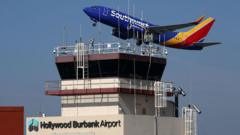When Air Canada flight attendants staged a strike recently, their rallying cry resonated widely: "Unpaid work won't fly." This powerful statement drew attention to a long-standing issue within the aviation industry, particularly in North America, where cabin crew have historically gone uncompensated for their work on the ground prior to takeoff.
The issue of unpaid work prompted widespread support among Canadian travelers, with polls indicating a strong backing for the striking attendants. The disruption, which occurred during the busy summer travel season, resulted in a tentative agreement between the Canadian Union for Public Employees (CUPE) and Air Canada. While full details of the agreement have yet to be released, sources suggest it includes pay increases and, notably, compensation for pre-departure duties, marking a significant first for the sector.
This development has been characterized as "historic," with the union declaring an end to the practice of unpaid work. However, there remains some uncertainty regarding whether flight attendants will approve the deal, as many express dissatisfaction with its provisions.
The issue of ground pay is not confined to Air Canada; other Canadian airlines like Air Transat and WestJet have similar compensation structures, as do some U.S. carriers. The absence of ground pay is often justified by the difficulty in tracking time spent boarding, especially when factoring in passenger delays. Despite this, experts believe that Air Canada could set a precedent for compensation in the industry, potentially leading to widespread changes.
Historically, airlines compensated cabin crews with adjusted hourly rates to account for the absence of ground pay, but many still find these wages insufficient for living in expensive cities. Recent figures show half of Air Canada's mainline flight attendants earned over C$54,000 last year—a figure many found unrepresentative of the true workload.
As the conversation around compensating ground work gains momentum, the shift has been percolating since the COVID-19 pandemic altered operational protocols. New requirements, such as enhanced passenger checks, increased the burden on flight attendants and raised more awareness about their unpaid labor.
Delta Airlines broke new ground in 2022, becoming the first major airline in North America to compensate cabin crew for ground work, a move followed by other carriers. Now, with Air Canada on board, industry leaders are speculating that ground pay will become more commonplace throughout the continent.
Manifold implications are unfolding from this strike, being heralded as a crucial moment for labor rights in Canada. The striking union's resilience in the face of government intervention has garnered public support, raising hopes for labor equity across various sectors.
With upcoming contract negotiations for Air Transat and WestJet, experts believe that the groundwork laid by the Air Canada strike could lead to a push for similar compensation practices, reshaping the compensation landscape for airline workers in the near future.






















